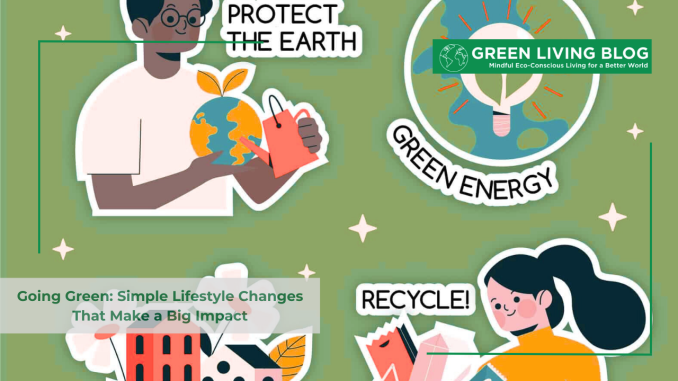
The conversation around climate change, environmental degradation, and sustainability has reached a fever pitch. From documentaries and books to international agreements, the call to “go green” has never been louder—or more urgent. Yet for many, the challenge isn’t knowing that we need to act—it’s knowing where to start. The good news? Even small, simple changes in your daily life can make a meaningful difference for the planet.
Going green doesn’t require a complete lifestyle overhaul or massive sacrifices. Instead, it’s about making intentional, sustainable choices that, collectively, lead to a bigger impact. Here are some straightforward, practical ways you can integrate eco-friendly habits into your everyday routine—and why they matter.
1. Rethink Your Commute

Transportation is one of the largest contributors to greenhouse gas emissions. Choosing greener commuting options is a powerful way to reduce your personal carbon footprint.
Simple Changes to Try:
- Walk or bike whenever possible. It’s healthy for you and the environment.
- Carpool or use public transportation to cut down on the number of vehicles on the road.
- If you’re in the market for a new car, consider an electric or hybrid vehicle.
- Work remotely a few days a week if your job allows fewer commutes means fewer emissions.
Even swapping out just a few car trips a week for alternative transportation can add up to significant environmental savings over time.
2. Cut Down on Single-Use Plastics
Plastic pollution is a major global issue, impacting oceans, wildlife, and human health. By reducing our reliance on disposable plastics, we can lessen the burden on landfills and ecosystems.
Simple Changes to Try:
- Carry a reusable water bottle and coffee cup.
- Keep a reusable shopping bag in your car or backpack.
- Switch to reusable produce bags and bulk food containers.
- Say no to plastic straws and utensils; carry your own compact, reusable set instead.
It’s estimated that Americans use 100 billion plastic bags a year. Imagine the collective impact if even half of us switched to reusable options!
3. Embrace Energy Efficiency
You don’t have to install solar panels or wind turbines to make a difference (though if you can, it’s even better!). Everyday energy efficiency is more attainable than you might think.
Simple Changes to Try:
- Switch to LED light bulbs, which use at least 75% less energy than incandescent ones.
- Unplug devices when not in use “phantom” energy can account for up to 10% of household electricity use.
- Use a programmable thermostat to better regulate heating and cooling.
- Wash clothes in cold water and dry air when possible.
Small tweaks like these can lower your carbon footprint and your utility bills.
4. Shift Toward a Plant-Based Diet

You don’t have to become a vegan overnight to make a positive impact. Even reducing your consumption of meat and dairy can lower your carbon footprint and decrease demand on resource-heavy food systems.
Simple Changes to Try:
- Try Meatless Mondays or go vegetarian a few days a week.
- Support local farmers and shop at farmers’ markets.
- Choose organic and sustainably grown products when available.
- Minimize food waste by planning meals and using leftovers creatively.
According to studies, eating more plants and fewer animal products is one of the most powerful ways individuals can help combat climate change.
5. Choose Sustainable Fashion
Fast fashion has a hidden environmental cost: waste, pollution, and unethical labor practices. The good news is that more sustainable options are easier to find than ever before.
Simple Changes to Try:
- Buy less, choose well. Invest in higher-quality pieces that last.
- Support brands that prioritize ethical production and sustainable materials.
- Shop secondhand at thrift stores, consignment shops, and online marketplaces.
- Repurpose and repair clothing rather than throwing it away.
The average American throws away around 81 pounds of clothing each year. A little mindfulness can dramatically reduce that number.
6. Create a Greener Home
Your living space can also be a force for environmental good with just a few conscious decisions.
Simple Changes to Try:
- Start a compost pile for kitchen scraps.
- Plant a small garden (even a windowsill herb garden counts).
- Switch to eco-friendly cleaning products free of harsh chemicals.
- Install low-flow faucets and showerheads to conserve water.
Making your home greener doesn’t have to be complicated, it just takes a little creativity and intention.
7. Support Eco-Conscious Companies
Where you spend your money matters. Companies notice when consumers demand more sustainable practices, and your purchasing choices can drive broader industry changes.
Simple Changes to Try:
- Research brands before buying to see if they have sustainable policies.
- Choose businesses that prioritize environmental responsibility, ethical sourcing, and transparency.
- Use your voice—email companies asking for greener options or thanking them for existing efforts.
Voting with your wallet sends a powerful message to corporations and helps shift markets toward sustainability.
8. Get Involved Locally

Individual actions are critical, but community efforts amplify your impact even more.
Simple Changes to Try:
- Join a local environmental group or attend clean-up events.
- Advocate for greener policies in your town or city.
- Volunteer for organizations that focus on conservation or education.
- Educate others by sharing what you’ve learned and encouraging collective action.
When neighbors, coworkers, and friends band together, big things happen.
Why Small Changes Matter
You might wonder: Does it really matter if I bring a reusable bag to the store or bike to work once a week? The answer is a resounding yes. When millions of people make small, eco-friendly choices, the cumulative effect is transformative.
Moreover, personal change often sparks broader change. Being mindful about your habits can influence others, inspire businesses, and even shape public policies. Going green isn’t just about your individual impact, it’s about building a more sustainable culture that ripples outward.
Final Thoughts
Going green doesn’t have to be overwhelming or expensive. It starts with simple, achievable lifestyle changes that, over time, make a big difference. Whether you’re cutting down on single-use plastics, embracing plant-based meals, or supporting ethical companies, every action you take moves us all toward a healthier, more sustainable future.
The planet needs us, and we need the planet. By adopting greener habits today, you’re not just preserving the Earth for future generations, you’re also enriching your own life with healthier, more mindful practices.
Start small. Start today. The impact you make will be bigger than you realize.
About the Author:
Kristina is a writer for Dreamstime and sustainability advocate with a passion for reconnecting people to the natural world. With a background in environmental studies and a love for storytelling, she explores the intersection of ecology, culture, and everyday choices.
![]()
Author Profile
- Passionate content creator, contributor, freelance writer and content marketing allrounder.
Latest entries
 DictionaryJanuary 19, 2026What is Microplastics Pollution & How to Avoid Microplastics
DictionaryJanuary 19, 2026What is Microplastics Pollution & How to Avoid Microplastics Green LivingJanuary 15, 2026Green Transport Options for People with Mobility Challenges
Green LivingJanuary 15, 2026Green Transport Options for People with Mobility Challenges DictionaryJanuary 13, 2026Is Trend-Driven or Evergreen Sustainability Content Winning in 2026?
DictionaryJanuary 13, 2026Is Trend-Driven or Evergreen Sustainability Content Winning in 2026?  Green LivingDecember 18, 2025Self-Service Hydration: Should You Choose Mains-Fed or Bottled Water?
Green LivingDecember 18, 2025Self-Service Hydration: Should You Choose Mains-Fed or Bottled Water?






Leave a Reply
You must be logged in to post a comment.